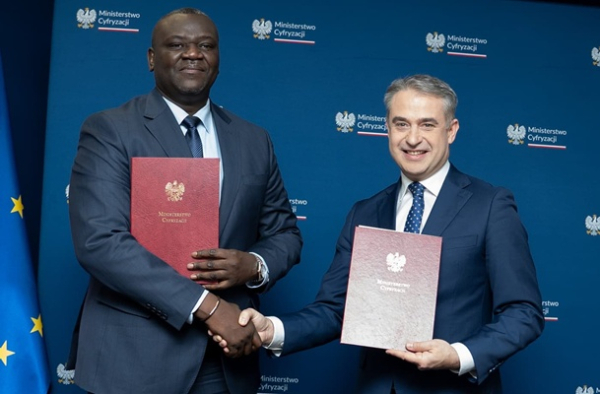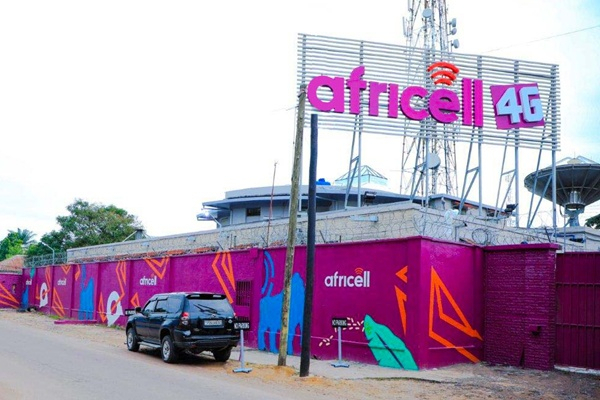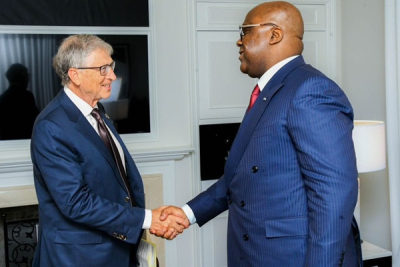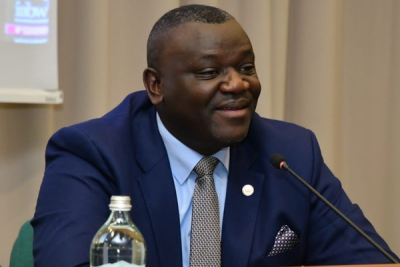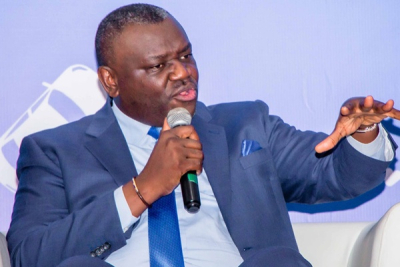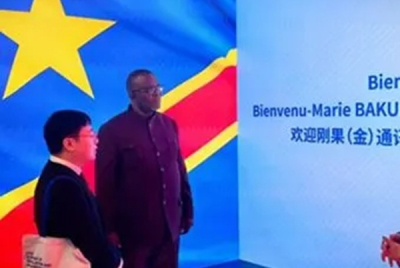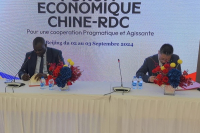
DIGITAL (49)
Poland will help the Democratic Republic of Congo develop its digital sector. The related Memorandum of Understanding (MoU) was signed on November 8, 2024, by Augustin Kibassa Maliba, the Congolese Minister of Posts and Telecommunications, and Krzysztof Gawkowski, the Polish Deputy Prime Minister for Digitalization. This agreement focuses on improving digital infrastructure, training, cybersecurity, digitizing administrative services, and supporting tech startups, among others.
Specifically, Poland will help the DRC acquire hardware and technology to enhance its communication and digital systems. The agreement also includes support for public administrations to boost efficiency, transparency, and access to services.
Regarding cybersecurity, the deal aims to strengthen the DRC's defenses against cyber threats by providing technical assistance during attacks and developing rapid response strategies.
The memorandum also plans to establish ICT vocational training centers to prepare a new generation of digital professionals in the DRC. These centers will focus on practical training and access to advanced technologies. Additionally, there will be training programs and workshops for ICT professionals and civil servants to enhance their skills in digital technology and cybersecurity.
Support for startups is also included in the agreement, offering opportunities for study trips, professional exchanges, access to technology incubators, funding, mentoring, and essential equipment.
The MoU is a milestone in cooperation between the DRC and Poland, and it is Poland's first digital agreement with an African nation. It follows a meeting between Congolese President Félix Tshisekedi and Polish President Andrzej Duda during the UN General Assembly last September. Since then, experts from both countries have been collaborating on various digital and border surveillance projects.
Pierre Mukoko
Africell Holding Limited, a telco present in various African countries including the Democratic Republic of Congo (DRC), raised $300 million in the international capital market last month. This funding came from a covered bond issue that will mature in 2029. The offering was popular among investors, with bids totaling $550 million.
Africell will use the money to refinance its existing debt and boost its investment capacity, especially in the DRC, where the company has strong growth potential. The financing package also includes a $30 million revolving credit facility yet to be used. This deal improves Africell's financial position by reducing short-term cash needs and supporting sustainable growth. The funds will help lower operating costs and manage currency risks, which are important issues in the DRC, and Angola, another market where Africell operates.
Besides the DRC and Angola, Africell is well-established in markets like Gambia and Sierra Leone. Although the DRC is the telco’s fourth-largest market, the country’s size and increasing demand for mobile and internet services present major opportunities for expansion.
A year ago, Africell announced plans to expand into three new provinces in eastern DRC: North Kivu, South Kivu, and Tanganyika. The company wants about four million new customers in these areas where access to mobile networks is poor.
The recent fundraising was arranged by Citigroup, J.P. Morgan, and Standard Chartered. Part of the proceeds will help enhance Africell's network infrastructure, diversify its financing sources, and increase sales while ensuring financial stability for future investments in the DRC and other African countries.
Georges Auréole Bamba
Microsoft co-founder, Bill Gates, met with the President of the Democratic Republic of Congo (DRC), Félix Tshisekedi, on September 24. During the meeting, Gates explored the possibility of improving satellite internet connectivity to bolster education in the DRC. According to the Ministry of Health, the American billionaire requested the audience.
If the project moves forward, Gates might implement his satellite internet solution on a large scale using technology from Kymeta, a company in which Microsoft invested $85 million in 2020. This would give Gates an edge over Elon Musk, whose Starlink services are currently banned in the DRC due to licensing issues.
Bill Gates expressed interest in the DRC's agricultural sector, which needs substantial investment to meet national demand and develop its potential as a food exporter. He also mentioned support from the Gates Foundation for public health initiatives, particularly in fighting diseases like polio.
Few days before the meeting, Congolese Minister of Higher Education Marie-Thérèse Sombo launched the "One student, one computer" project. This project aims to make university training more innovative. "This project aims for inclusiveness and equity, as it grants the same opportunities to all students, without distinction," the official said, quoted by Radio Okapi.
Though it was not reported, Gates and Tshisekedi may have also talked about mining. In November 2023, KoBold, a company active in Zambia's copper sector, expressed interest in expanding into the DRC. KoBold's main shareholder is Breakthrough Energy Ventures, which includes several billionaires like Gates and Jeff Bezos.
Georges Auréole Bamba
Augustin Kibassa Maliba, Minister of Telecommunications and Digital Technologies of the Democratic Republic of Congo (DRC), is also in New York, US, for the ongoing 79th UN General Assembly. On the sidelines of the event, Maliba said he will explore innovative solutions for digital cooperation with various government partners and international organizations at Google's office in Manhattan.
The Congolese official also said he will promote investment opportunities in the DRC's digital sector. Minister Maliba will participate in a bilateral meeting between Congolese President Félix Tshisekedi and Polish President Andrzej Duda at the Polish consulate in New York.
Digital technology is a key part of the DRC’s economic diversification strategy. Under this strategy, the Congolese government plans to improve broadband connectivity, enhance digital inclusion, transform public services, and attract international investors in high-value digital products and services.
Minister Maliba's trip to the U.S. follows his recent visit to China, where he presented business opportunities in the Congolese digital sector to potential investors. The national digital plan aims to "use the digital sector as a lever for integration, good governance, economic growth, and social progress." The DRC needs expertise and funding to achieve this. The talks in New York could help the country in this regard.
Muriel Edjo
The government of the Democratic Republic of the Congo aims to make the country a top international tourist destination by 2030. To attract 10 million visitors and create between 200,000 and 500,000 jobs, social networks have been identified as a key tool, along with other services.
On September 11, Augustin Kibassa Maliba, Minister of Posts, Telecommunications and Digital Affairs, highlighted the importance of social networks for promoting the country's image internationally. "We, Congolese, are key tourism players to ensure that our country is visited by investors. Beyond the efforts made by the government, we have a responsibility to speak well of the Congo to our children... We must know that the image we want to build must first be carried by future generations," Maliba said during a Forum to Validate the National Tourism Strategy.
Maliba also mentioned that new telecommunications laws now allow for the prosecution of offenses committed through social networks: "We're in the process of educating the Congolese about what's in these texts that protect us all, including the country's brand image. When the time comes, we'll tighten the screw because it's not normal to see what's happening on social networks."
During the recent China-Africa Cooperation Forum held in Beijing from September 4 to 6, the DRC signed a memorandum of understanding with an undisclosed Chinese company for a social network monitoring system. Commenting on the matter, Maliba clarified that this would not involve blocking networks or closing accounts; instead, it aims to encourage quality content production as part of the country's branding strategy.
The DRC's economy heavily relies on natural resources like lithium and cobalt. However, in line with International Monetary Fund (IMF) recommendations, the country now seeks to diversify its economy.
Tourism contributes less than 2% to GDP, according to the Congolese Ministry of Tourism, and 1.8% according to the World Travel and Tourism Council in 2024.
Muriel Edjo
Chine Nouvelle, a Chinese news agency, wants to contribute to the digital transformation of the Agence Congolaise de Presse (ACP). Last week, during the Forum on China-Africa Cooperation, Fu Hua, President of Chine Nouvelle, renewed this commitment to ACP Director General Bienvenu-Marie Bakumanya, stressing the importance of strengthening media ties between China and the Democratic Republic of Congo (DRC).
The partnership announcement comes amidst major challenges facing Congolese media outlets, especially the ACP. Such challenges include upgrading infrastructures and integrating new technologies.
According to the ACP chief, Bienvenu-Marie Bakumanya, the ACP must shift to digital if it wants to "stay relevant in a global landscape where information is disseminated at great speed, notably via digital platforms".
Chine Nouvelle’s support will help the ACP produce and distribute news in a more modern way. This collaboration could also stimulate cultural and media exchanges between China and the DRC. "Our two people don't know each other well enough. Our media must collaborate to enable better mutual understanding between the Congolese and the Chinese,” Bakumanya, ACP’s boss said.
OS
The Democratic Republic of Congo is in talks with a Chinese company about a social network monitoring system. On September 4, 2024, Augustin Kibassa Maliba, Minister of Posts, Telecommunications, and Digital, signed a memorandum of understanding to this effect in Beijing, at the DRC embassy in China, on the sidelines of the China-Africa Cooperation Forum.
Although the Congolese government did not provide further details about this non-legally binding agreement, the system may help authorities manage and regulate online content in the DRC. Faced with the resurgence of disinformation, hate speech, and other illicit content on social media, the government could leverage the system to stop activities likely to undermine national security and social cohesion.
The DRC’s socio-political context is currently marked by armed tensions with the M23 rebels in the east, friction with Rwanda, and a monkeypox epidemic. These create fertile ground for fake news and propaganda. Claims that a digital army is working to destabilize the country are multiplying on social networks. An analysis note from CIPESA deplores this information war, which it deems "characterized by a spiral of incitement, disinformation, misinformation, and hate speech" that "undermines cohesion between communities".
According to DataReportal, the DRC registered 6.45 million active user identities on social networks in January 2024, representing growth of 37.2% or 1.8 million new users between January 2023 and January 2024. 37.2% of social media users in the DRC were women, while 62.8% were men. All these users subscribed to Facebook; 4.44 million to TikTok; 1.15 million to Messenger; almost 670,000 to Instagram; 620,000 to LinkedIn and 253,000 to X.
In many African countries, including the DRC, social media play an important role in everyday life. But they also raise increasingly complex ethical challenges, requiring urgent attention. Striking the right balance between defending freedom of speech and tackling online abuses is the puzzle most countries on the continent seek to solve.
Muriel Edjo






